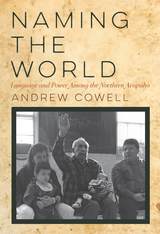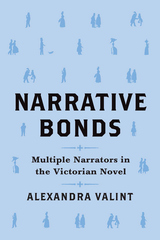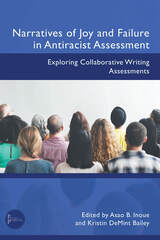199 books about 1945-1989 and 5
start with O
199 books about 1945-1989 and 5
199 books about 1945-1989
5 start with O start with O
5 start with O start with O

On Cultural Freedom
An Exploration of Public Life in Poland and America
Jeffrey C. Goldfarb
University of Chicago Press, 1983
In this timely study, Jeffrey C. Goldfarb explores the nature and prospects of cultural freedom by examining the conditions that favor or threaten its development in the political East and West.
Goldfarb—who examines conditions in the Soviet Union, the United States, and their respective European allies—focuses most closely upon Poland and the United States. He investigates a wide range of concrete cases, including the Polish opposition movement and Solidarity, the migration of artists, the American television and magazine industries, American philanthropy, and communist cultural conveyor belts.
From these cases, Goldfarb derives a definitive set of sociological conditions for cultural freedom: critical creativity which resists systematic constraints, continuity of cultural tradition, and a relatively autonomous public realm for the reception of culture. Cultural freedom, Goldfarb shows, is not a static state but a process of achievement. Its parameters and content are determined by social practice in cultural institutions and by their relations with other components and the totality of social structure.
So defined, cultural freedom is transformed from an ideological concept into one with real critical and analytical power. Through it we can appreciate the invisible nature of constraint in the West and the unapparent but acting supports of cultural freedom existing in socialist countries. Most importantly, Goldfarb's conclusions provide a framework for understanding more clearly than before the circumstance of cultural freedom in both East and West so that citizens may utilize their full creative abilities as they address the problems of the present day.
Goldfarb—who examines conditions in the Soviet Union, the United States, and their respective European allies—focuses most closely upon Poland and the United States. He investigates a wide range of concrete cases, including the Polish opposition movement and Solidarity, the migration of artists, the American television and magazine industries, American philanthropy, and communist cultural conveyor belts.
From these cases, Goldfarb derives a definitive set of sociological conditions for cultural freedom: critical creativity which resists systematic constraints, continuity of cultural tradition, and a relatively autonomous public realm for the reception of culture. Cultural freedom, Goldfarb shows, is not a static state but a process of achievement. Its parameters and content are determined by social practice in cultural institutions and by their relations with other components and the totality of social structure.
So defined, cultural freedom is transformed from an ideological concept into one with real critical and analytical power. Through it we can appreciate the invisible nature of constraint in the West and the unapparent but acting supports of cultural freedom existing in socialist countries. Most importantly, Goldfarb's conclusions provide a framework for understanding more clearly than before the circumstance of cultural freedom in both East and West so that citizens may utilize their full creative abilities as they address the problems of the present day.
[more]

On Internal War
American and Soviet Approaches to Third World Clients and Insurgents
William E. Odom
Duke University Press, 1992
William E. Odom combines expertise in political science and military affairs to challenge both conventional and unconventional wisdom about insurgencies and political development. The author concludes that in all three components of U.S. strategy for counterinsurgency—political, economic, and military—faulty notions of causation inform policy. U.S. advice to embattled governments fails to recognize the inherent clash of development goals; direct fiscal aid hurts more often than it helps recipient governments; and the focus of U.S. military assistance on fighting insurgents plays to their strengths and fails to exploit their weaknesses.
On Internal War reviews the contrasting theory and practice in Soviet and American approaches to their competition in the Third World and relates them to indigenous causes of internal wars. Odom also integrates the military dimensions of insurgencies with external influences and internal politics. Drawing on political development theory, he underscores the sources of instability in Third World states that make insurgencies more likely and offers ways to assess the prospects for democracy in specific cases.
The centerpiece of the study is a practical application of the author’s analysis to three case studies—El Salvador, Guatemala, and the Philippines—and a regional assessment of the Middle East. Odom provides no panaceas but suggests that more promising strategies can be devised.
On Internal War reviews the contrasting theory and practice in Soviet and American approaches to their competition in the Third World and relates them to indigenous causes of internal wars. Odom also integrates the military dimensions of insurgencies with external influences and internal politics. Drawing on political development theory, he underscores the sources of instability in Third World states that make insurgencies more likely and offers ways to assess the prospects for democracy in specific cases.
The centerpiece of the study is a practical application of the author’s analysis to three case studies—El Salvador, Guatemala, and the Philippines—and a regional assessment of the Middle East. Odom provides no panaceas but suggests that more promising strategies can be devised.
[more]
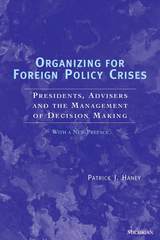
Organizing for Foreign Policy Crises
Presidents, Advisers, and the Management of Decision Making
Patrick J. Haney
University of Michigan Press, 2002
Presidents often assemble ad hoc groups of advisers to help them make decisions during foreign policy crises. These advisers may include the holders of the traditional foreign policy positions--secretaries of state and defense--as well as others from within and without the executive branch. It has never been clear what role these groups play in the development of policy. In this landmark study, Patrick Haney examines how these crisis decision groups were structured and how they performed the tasks of providing information, advice, and analysis to the president. From this, Haney investigates the links between a president's crisis management structure and the decision-making process that took place during a foreign policy crisis.
Haney employs case studies to examine the different ways presidents from Truman through Bush used crisis decision-making groups to help manage foreign policy crises. He looks at the role of these groups in handling the Berlin blockade in 1948, the Suez Crisis in 1956, the Tet offensive in 1968, the Yom Kippur War in 1973, and the Panama invasion in 1989, among other crises. He extends our understanding of the organization, management and behavior of the decision-making groups presidents assemble during foreign policy crises. This book will appeal to scholars of the American presidency and American foreign policy.
Patrick Haney is Assistant Professor of Political Science, Miami University of Ohio.
[more]
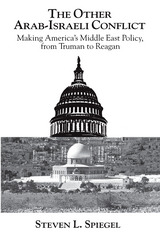
The Other Arab-Israeli Conflict
Making America's Middle East Policy, from Truman to Reagan
Steven L. Spiegel
University of Chicago Press, 1985
The Other Arab-Israeli Conflict illuminates the controversial course of America's Middle East relations from the birth of Israel to the Reagan administration. Skillfully separating actual policymaking from the myths that have come to surround it, Spiegel challenges the belief that American policy in the Middle East is primarily a relation to events in that region or is motivated by bureaucratic constraints or the pressures of domestic politics. On the contrary, he finds that the ideas and skills of the president and his advisors are critical to the determination of American policy. This volume received the 1986 National Jewish Book Award.
[more]
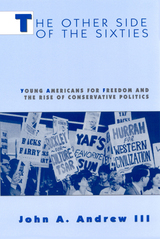
The Other Side of the Sixties
Young Americans for Freedom and the Rise of Conservative Politics
Andrew III, John A
Rutgers University Press, 1997
What were young conservatives doing in the 1960s while SDS and SNCC were working to move the political center to the left? The Other Side of the Sixties offers a gripping account of Young Americans for Freedom (YAF), an organization that became a leading force in promoting conservative ideas and that helped lay the groundwork for today's conservatism. John Andrew has mined unique archival material to document YAF's efforts to form a viable organization, define a new conservatism, attack the liberal establishment, and seize control of the Republican party, all while battling voter hostility and internal factionalism. The author also uncovers the Kennedy administration's use of the IRS to subvert YAF and other right-wing organizations through tax audits and investigations. By painting a more balanced portrait of political thinking in the sixties, Andrew offers a new and much needed look at the ideological atmosphere of a vibrant decade.
[more]
READERS
Browse our collection.
PUBLISHERS
See BiblioVault's publisher services.
STUDENT SERVICES
Files for college accessibility offices.
UChicago Accessibility Resources
home | accessibility | search | about | contact us
BiblioVault ® 2001 - 2025
The University of Chicago Press


